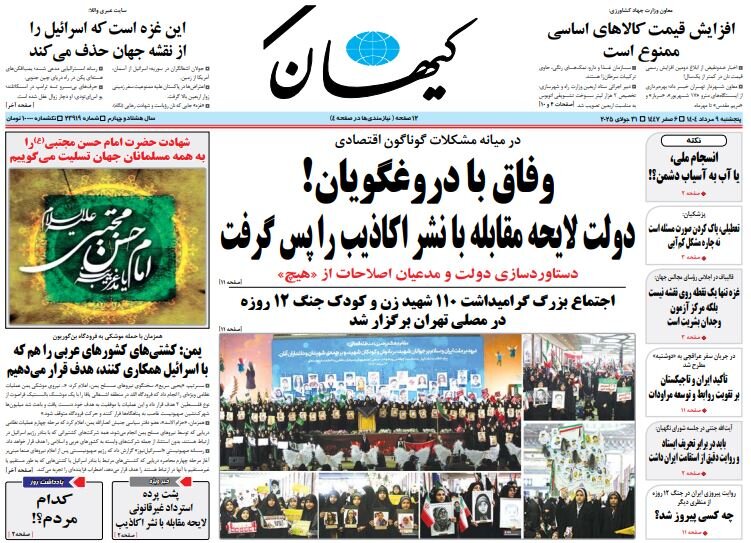Who won the war?

TEHRAN - Kayhan examined Iran’s success in the 12-day war initiated by the Israeli regime in June.
It said Israel launched a surprise attack with specific military objectives, none of which were achieved. Over the years, Zionist enemy had invested heavily in weapons, ammunition, and trained spies, aiming to destabilize Iran through coordinated terrorist operations and incite public unrest and riots. The ultimate goal was to overthrow the ruling system and fragment the country. The 12-day war, described as a clear confrontation between justice and aggression, garnered widespread support for Iran from freedom-seeking nations around the world. Many people raised Iran’s flag and displayed images of its leadership in solidarity. This wave of support disrupted the dominance of Western media narratives, exposed misinformation, and allowed the Islamic Republic’s perspective to be more broadly represented.
Iran: A test of commitment and ability
In a commentary, the Iran newspaper discussed the upcoming trip of Pezeshkian to Islamabad upon the official invitation of Pakistani Prime Minister Shahbaz Sharif and wrote: The atmosphere after the 12-day war has raised geopolitical tensions in the Middle East to a new and complex level. Therefore, the necessity of designing and implementing a common security model on the eastern borders of Iran and Pakistan has imposed itself on the officials of the two countries more than ever before. The necessity of security and intelligence cooperation to ensure stability in the borders and contain the chain of threats has become more evident than ever before. In such an environment, the looming trip of Pezeshkian to Islamabad is not merely ceremonial, but a test to measure the level of commitment and ability of the two countries to enter the operational phase of strategic cooperation, a cooperation that, if properly planned and pursued, will not only enhance border security, but also serve as a model for sustainable convergence in the region.
Khorasan: Iran needs to change its military doctrine
In an article, Khorasan discussed the need for Iran to define a new military doctrine. It said: The 12-day war between Iran and two nuclear-armed powers—the United States and Israel—marked the first time the threat shifted from a theoretical concern to a tangible reality. Naturally, this transformation should have profound effects on the understanding of Iran's national security and defense strategy, because governments are trying to maintain their survival in an anarchic environment. Before the attack, Tehran analyzed threats in a traditional, controllable, and symbolic framework. However, the experience of direct war, with two nuclear powers, should lead to a change in the perception and even the country's "security identity." This means that after the attack, Iran needs to redefine a new security identity for itself with a perception that resistance alone will no longer guarantee national security. Rather, perhaps it is time for Iran's security-military doctrine to transform into a symmetrical-unconventional one. Iran must now understand that the threat can be short-term, severe, and existential, and therefore it seriously needs to redesign its deterrent power. Security is not merely military, but technological, cyber, social, and even psychological. Survival requires building a new, multi-layered defense structure.
Arman-e-Melli: The U.S.-China struggle over Iranian oil sale
In a note, Arman-e-Melli analyzed China’s willingness to buy oil from Iran despite U.S. threats. It wrote: Despite the continuation of unilateral U.S. sanctions against the Islamic Republic of Iran, China remains one of the main buyers of Iranian crude oil. In recent years, despite Washington’s political and economic pressure, energy relations between Tehran and Beijing have strengthened, and a significant portion of Iran’s oil exports have been sent to China, especially through informal methods and circumventing the global financial system. During the recent tensions and the outbreak of war between Iran and the Israeli regime, statistics and field analyses have indicated an increase in China's oil imports from Iran. The U.S. Treasury Secretary has threatened China that it will face more sanctions if it purchases oil from Iran. However, Beijing has stated that they are an independent country that no one can decide for it what to do and what not to do. This shows that not only buying Iranian oil is economically profitable for the Chinese, but also is of great strategic and diplomatic importance to them.
Sharq: Will directives cause a change in cropping patten?
Amid the ongoing drought and critically low precipitation levels across Iran, Shaq newspaper warns that without substantial reforms and decisive action, reducing water consumption in the agricultural sector will remain unattainable. The paper writes:
“Each time the government issues a directive to implement agricultural reform, it rekindles memories of decades of failure and unproductive efforts among agricultural experts and stakeholders. These directives, while outwardly promising change and improved organization, often end up reproducing the same flawed, outdated, and repetitive cycle of the past.”
The recent order by President Pezeshkian to implement a national cropping pattern plan cannot resolve the crisis on its own. Without an effective and coordinated executive framework, such initiatives are unlikely to succeed. Ultimately, even the strongest political will and highest-level decisions cannot break the cycle of repeated failures unless they are supported by robust institutional, managerial, and operational infrastructure.
